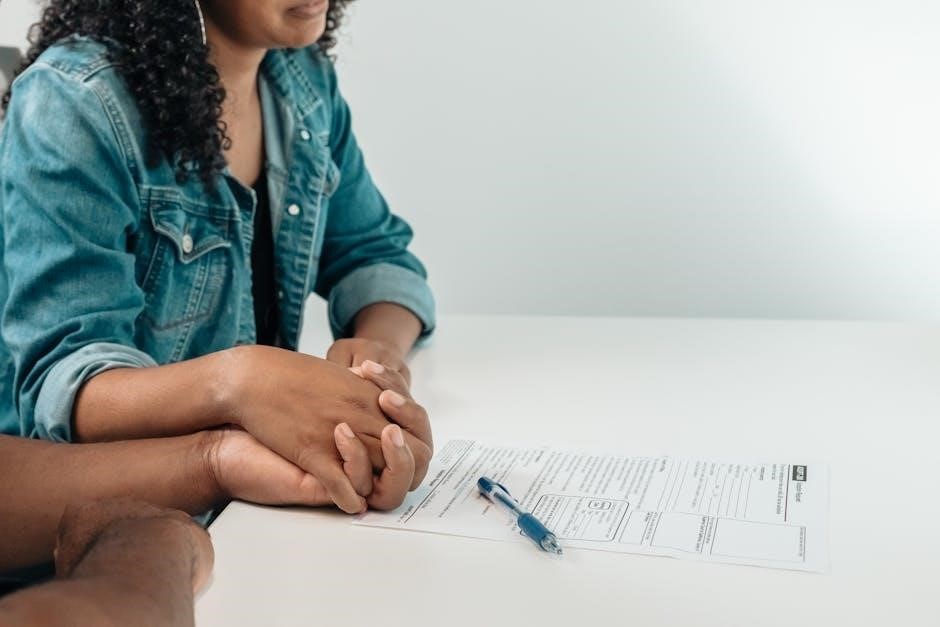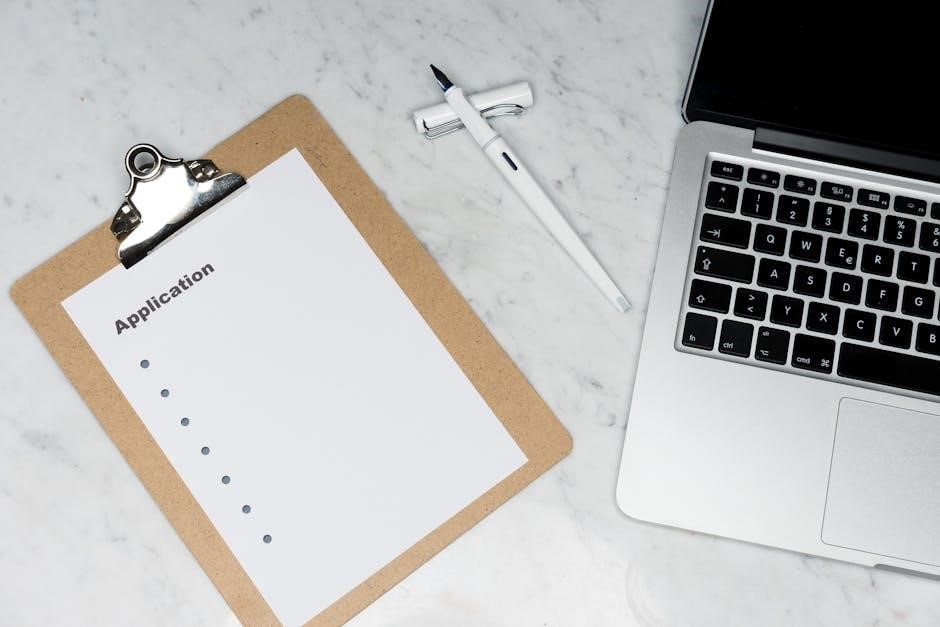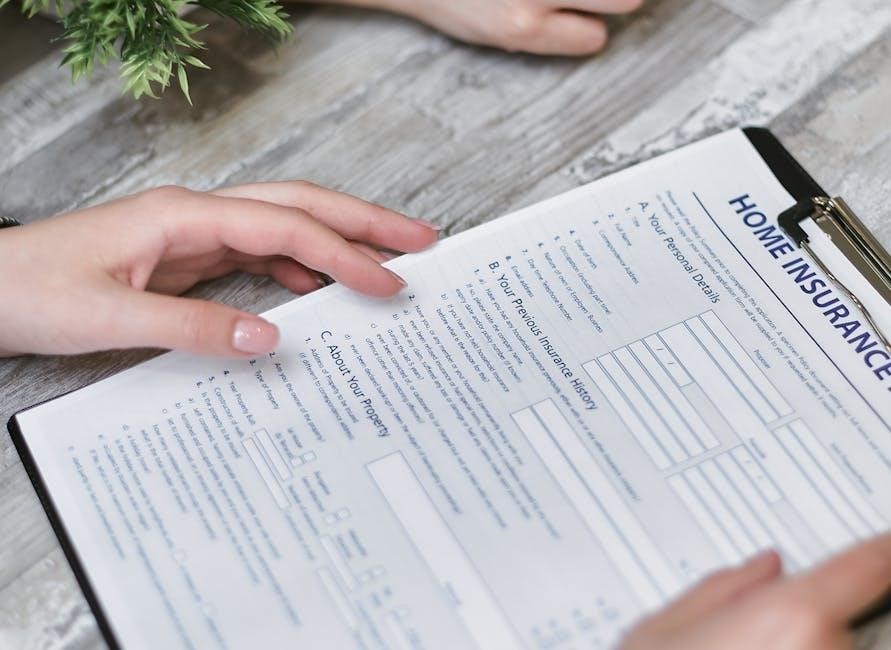The NJ Marriage License Application Form (REG-77) is essential for couples planning to marry in New Jersey. It streamlines the legal process, ensuring compliance with state requirements. Available as a downloadable PDF, it must be completed accurately and submitted to the Local Registrar. Recent updates promote inclusivity, accommodating nonbinary and LGBTQ+ applicants, reflecting New Jersey’s commitment to equality in marriage licensing.
Overview of the Marriage License Application Process in New Jersey
The marriage license application process in New Jersey is streamlined to ensure couples meet legal requirements efficiently. The process begins with obtaining the official REG-77 form, available as a PDF online. Applicants must provide proof of identity and residency, with additional documentation for special cases. The form is completed and signed under oath at the Local Registrar’s office. Recent updates ensure inclusivity, allowing nonbinary and LGBTQ+ individuals to apply without misgendering themselves. The process also includes a waiting period and fees, culminating in the issuance of the marriage license, which is valid for six months.
Importance of the Marriage License Application Form
The NJ Marriage License Application Form is a critical document ensuring the legality and validity of a marriage. It collects essential personal and legal information, verifying the eligibility of both parties to marry in New Jersey. The form also guarantees compliance with state laws, including recent updates promoting inclusivity for nonbinary and LGBTQ+ applicants. Proper completion and submission of the form are necessary to obtain the marriage license, which is required for the union to be legally recognized. Errors or omissions can delay the process, making accuracy and adherence to instructions crucial for a smooth application experience.

Obtaining the NJ Marriage License Application Form
The NJ Marriage License Application Form (REG-77) is available as a downloadable PDF from the official New Jersey Department of Health website. It is easily accessible online.
Where to Find the Official PDF Version of the Form
The official NJ Marriage License Application Form (REG-77) is available on the New Jersey Department of Health website. You can locate it by visiting their official portal and navigating to the marriage license section. The form is provided as a downloadable PDF, titled Marriage-License-Application.pdf, ensuring easy access for applicants. Additionally, it can be found on local municipal websites or by contacting the Local Registrar’s office in your county. The PDF is also accessible in Spanish for linguistic inclusivity.
Steps to Download the Application Form
To obtain the official NJ Marriage License Application Form (REG-77), visit the New Jersey Department of Health website. Navigate to the marriage license section, where you’ll find a link to the PDF version. Click on the link to download the form, titled Marriage-License-Application.pdf. Save it to your device for easy access. The form is also available in Spanish for linguistic accessibility. Ensure you download the most recent version to avoid any issues during submission. Once downloaded, review the form carefully before filling it out.

Required Documents for Marriage License Application
Applicants must provide proof of identity (driver’s license, passport, or state ID) and residency. Additional documentation may be required for special cases, ensuring accurate processing.
Proof of Identity and Residency Requirements
Applicants must provide valid proof of identity, such as a driver’s license, passport, or state/federal ID. Residency verification is also mandatory, typically through utility bills or bank statements. Non-citizens may need to present additional documentation, such as a visa or green card, to establish eligibility. Ensure all documents are up-to-date, as expired or invalid documents may delay processing. Clear photocopies or originals are often required for verification purposes.
Additional Documentation for Special Cases
In certain situations, such as remarriage, civil union, or reaffirmation, additional documents are required. Divorced individuals must provide a certified divorce decree or annulment papers. Widowed applicants need to submit a death certificate of their deceased spouse. For name changes, a court order or legal documentation is necessary. Nonbinary individuals may need to provide specific affidavits or updated identification reflecting their gender identity. Ensure all documents are certified and meet the state’s standards to avoid delays in processing the marriage license application. Proper documentation ensures compliance with New Jersey’s legal requirements for special cases.

Filling Out the Marriage License Application Form
The NJ Marriage License Application Form must be filled out accurately and completely. Ensure all fields are filled, and follow specific instructions carefully. Accuracy avoids delays.
Guidelines for Completing the Form Accurately
Accurately completing the NJ Marriage License Application Form is crucial to avoid delays. Ensure all fields are filled legibly and truthfully, using black ink. Do not sign the form before submitting it to the Local Registrar, as it must be signed under oath. Provide full legal names, dates of birth, and residential addresses. Disclose information about previous marriages or civil unions, if applicable. Include details about the officiant and ceremony location. Double-check all entries for errors or omissions. Incomplete or incorrect applications may result in processing delays or rejection. Be thorough to ensure a smooth experience.
Do’s and Don’ts When Filling the Application
When completing the NJ Marriage License Application Form, ensure accuracy by filling it out legibly and truthfully. Do fill out the form prior to your appointment but avoid signing it beforehand, as it must be signed under oath. Provide full legal names, dates of birth, and residential addresses. Disclose details about prior marriages or civil unions if applicable. Do include accurate information about the officiant and ceremony location. Avoid errors, omissions, or false information, as these can delay processing. Do not use abbreviations or nicknames; legal names are required. Adhere to these guidelines to ensure a smooth application process.
Submission and Processing of the Application
Submit the completed NJ Marriage License Application Form to the Local Registrar’s office. Processing typically takes 24-48 hours, with a mandatory 72-hour waiting period before issuance. Fees apply.
How to Submit the Completed Application
To submit the NJ Marriage License Application Form, download the official PDF (REG-77) from the New Jersey Department of Health website. Fill it out accurately but do not sign it beforehand, as it must be signed under oath at the Local Registrar’s office. Gather required documents, such as proof of identity and residency, and bring them to the appointment. Submit the form in person at the Local Registrar’s office in the municipality where the marriage will occur. The form is also available in Spanish for accessibility. Ensure all fields are completed to avoid delays in processing.
Processing Times and Fees Associated
The processing of the NJ Marriage License Application Form typically takes a few days. A fee of $28 is required, payable at the Local Registrar’s office. After submitting the completed application, there is a mandatory 72-hour waiting period before the marriage license is issued. The license is valid for six months from the date of issuance. Fees may vary slightly depending on the municipality, so it is advisable to confirm with the Local Registrar beforehand. Additionally, there may be a small fee for copies of the marriage certificate after the ceremony. Ensure all payments are made as specified to avoid processing delays.
Special Considerations
New Jersey’s marriage license application ensures inclusivity for all applicants, including nonbinary individuals. Recent updates accommodate diverse needs, promoting equality in the marriage licensing process statewide.
Inclusivity for Nonbinary and LGBTQ+ Applicants
New Jersey has made significant strides in ensuring inclusivity for nonbinary and LGBTQ+ individuals in the marriage license application process. Recent updates to the application form allow nonbinary applicants to select gender-neutral options, eliminating the need to misgender themselves. This change reflects the state’s commitment to equality and legal recognition of all individuals, regardless of gender identity. The revised form aligns with New Jersey’s progressive stance on LGBTQ+ rights, ensuring that the marriage license process is accessible and respectful to all applicants. This inclusivity is a testament to the state’s dedication to equality.
Corrections and Revisions to the Application
If errors are found on the submitted marriage license application, corrections must be made promptly. Applicants should contact the Local Registrar to amend any inaccuracies. The form cannot be altered after submission, so it’s crucial to review all information carefully before finalizing. In cases where revisions are needed, applicants may need to resubmit the form, potentially delaying processing. Ensuring accuracy initially helps avoid complications and additional fees. Correcting errors promptly ensures the marriage license process remains smooth and efficient for all parties involved in New Jersey. Attention to detail is key to avoiding delays.

What Happens After Submitting the Application
After submitting the application, it is reviewed and processed. Once approved, the marriage license is issued, allowing the ceremony to take place within 30 days.
The Next Steps in the Marriage License Process
After submitting the application, the Local Registrar reviews it for completeness and accuracy. Once approved, a marriage license is issued, typically within a few days. Couples must wait 72 hours before using it. The license is valid for 30 days and must be used within New Jersey. Both parties should bring the license to their ceremony for the officiant to complete. After the ceremony, the officiant files the license with the Registrar, and the couple receives a certified marriage certificate, finalizing their legal union.
Obtaining the Final Marriage License
Once the application is approved, the couple receives a marriage license, valid for 30 days. After the ceremony, the officiant completes and signs the license, returning it to the Local Registrar. The Registrar processes the document and provides the couple with a certified marriage certificate. This certificate serves as legal proof of marriage and can be used for official purposes, such as name changes or benefits. Couples should ensure the officiant returns the completed license promptly to receive their certified copy, finalizing their legal union in New Jersey.
